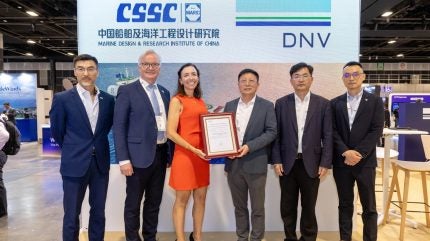
DNV has awarded an Approval in Principle (AiP) to the Marine Design and Research Institute of China (MARIC) for a new ammonia-ready Kamsarmax bulk carrier design.
An AiP is an independent evaluation confirming that a concept design is feasible and faces no significant barriers to realisation.
At a length of 229m and an increased beam of 38m, the carrier’s design has been “optimised” for greater cargo volume at the same draft.
The vessel’s hull structure is reinforced, and space has been reserved for convenient retrofitting of ammonia tanks and drive systems.
Equipped with 4,500m3 capacity tanks, the carrier can navigate over 15,000nm at design speed while using ammonia as fuel.
MARIC vice-president Jian Zhang Zhu said: “We are proud to announce our strategic collaboration with DNV, to pioneer the design of a 91k DWT ammonia-fuelled bulk carrier.
“This partnership underscores our commitment to advancing green shipping technologies and accelerating the maritime industry’s transition to a low-carbon future.
“By working together we can overcome the technical and operational challenges associated with ammonia as a marine fuel, deliver a cutting-edge solution that aligns with global decarbonisation goals, and set a new benchmark for clean, efficient, and commercially viable bulk carriers.”
In 2021, DNV released the inaugural edition of its classification rules for ammonia-fuelled vessels. Subsequent updates were made in 2022 and 2023, and included the Gas Fuelled Ammonia class notation.
This notation provided shipowners with the confidence to construct vessels designed for future ammonia propulsion by outlining the necessary specifications required.
This year, DNV released a white paper titled “Safe introduction of alternative fuels – Focus on ammonia and hydrogen as ship fuels” that is claimed to offer shipowners with insights and tools to help them navigate the evolving regulatory environment and implement ammonia and hydrogen as fuels for their vessels.
Last year in December, DNV launched a new competence standard and recommended practice to ensure the safe use of methanol and ammonia as fuels on ships.



